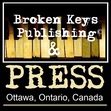Broken Keys Publishing's Blog, page 64
July 7, 2015
A Dark Corner of My Soul: Selective Poetry
A Dark Corner of My Soul
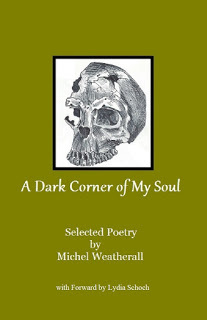
A short selective collection of dark poetry.
With Forward by Lydia Schoch.
Update: Available Saturday, July 11th!
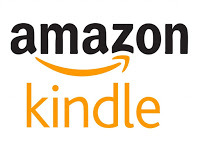
Available on Amazon Kindle

as well as

A short selective collection of dark poetry.
With Forward by Lydia Schoch.
Update: Available Saturday, July 11th!

Available on Amazon Kindle

as well as
Published on July 07, 2015 04:31
June 28, 2015
Data, Knowledge, Wisdom and the Death of Literature.
Five years ago I posted an article about what effects this internet age is inflicting upon mentor-protege relationships, entitled Mentors, Proteges, and Printers. This same theme was alluded to in My Enduring Path to Mindfulness (from a martial artist point of view).
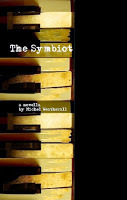
Recently, (March of 2015) I published my first work of fiction. The Symbiot. (It is available in both hard copy (print) and Kindle). It is the first in what will be either a trilogy or four-part piece.
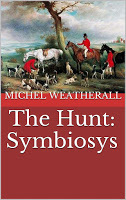
The second novel, The Hunt: Symbiosys, is written but due for release in the Fall of 2015.
(This is preliminary cover art - more conceptual than anything else. If you're an artist and would like to summit artwork, please, I would be more than grateful!)
The third book (Necropolis) I am in the middle of writing.
The series takes place in a Lovecraftian world, and without giving away any spoilers, Cthulhu makes and appearance in the third... sort of.
Now, I figured I had better do some of my homework, and in my meandering about, I stumbled across the fact the Cthulhu has a "Son" and "Daughter". (The words son and daughter might not be the best terms to use... maybe "spawn of" might be better as they are anything but human or human-like).
I googled Ghatanothoa and Cthylla only to discover that both appear in "Out of the Aeons" (by H.P. Lovecraft and Hazel Heald, 1933) and "The Transition of Titus Crow" (by Brian Lumbly, 1975), both books of which I have in my library and have read. But I didn't remember these monsters.
Now, in all fairness, I discovered Lovecraft at the end of High School and the early days of Collage. I went on a reading blitz and voraciously devoured anything and everything I could lay my hands on that was Lovecraft.... It is a great deal of material. Maybe I just missed it. Maybe it was one of those days on the bus I kept nodding off to sleep... who can say for certain? (Maybe it was because this was all 28 years ago!)
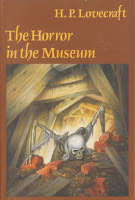
But I digress. Last night I pulled out my Arkham House printed edition of "The Horror in the Museum" (1970) - which is where you would find "Out of the Aeons".
The most obvious thing dawned on me when I read "Out of the Aeons". There is a beautiful art is the telling of a story. It is not simply a series of 'facts' or statements. It is a craft. It is truly the realm of the wordsmith; the weaving of a narrative. There is a pace, a theme, a flavour! There is not only an art to writing and telling a story, there is also an art, a pleasure , a pace , if you will - in reading a story... and I think that art is dying or dead.
The wikipedia google search for "Out of the Aeons" lays out - spoilers and all - of the entire short story. It basically butchers it. It was an annotated version of its Cole's Notes. The craft of these two writers (as well as yourself as the reader) was killed. The suspense, the tension, the feel is gone. Is this what the youth of today see & read? Are they missing the beautiful subtle nuances in favour of simple data? It knowledge being mistaken for its experience?
Sadly, I think so. Is the art of reading dying?

Recently, (March of 2015) I published my first work of fiction. The Symbiot. (It is available in both hard copy (print) and Kindle). It is the first in what will be either a trilogy or four-part piece.

The second novel, The Hunt: Symbiosys, is written but due for release in the Fall of 2015.
(This is preliminary cover art - more conceptual than anything else. If you're an artist and would like to summit artwork, please, I would be more than grateful!)
The third book (Necropolis) I am in the middle of writing.
The series takes place in a Lovecraftian world, and without giving away any spoilers, Cthulhu makes and appearance in the third... sort of.
Now, I figured I had better do some of my homework, and in my meandering about, I stumbled across the fact the Cthulhu has a "Son" and "Daughter". (The words son and daughter might not be the best terms to use... maybe "spawn of" might be better as they are anything but human or human-like).
I googled Ghatanothoa and Cthylla only to discover that both appear in "Out of the Aeons" (by H.P. Lovecraft and Hazel Heald, 1933) and "The Transition of Titus Crow" (by Brian Lumbly, 1975), both books of which I have in my library and have read. But I didn't remember these monsters.
Now, in all fairness, I discovered Lovecraft at the end of High School and the early days of Collage. I went on a reading blitz and voraciously devoured anything and everything I could lay my hands on that was Lovecraft.... It is a great deal of material. Maybe I just missed it. Maybe it was one of those days on the bus I kept nodding off to sleep... who can say for certain? (Maybe it was because this was all 28 years ago!)

But I digress. Last night I pulled out my Arkham House printed edition of "The Horror in the Museum" (1970) - which is where you would find "Out of the Aeons".
The most obvious thing dawned on me when I read "Out of the Aeons". There is a beautiful art is the telling of a story. It is not simply a series of 'facts' or statements. It is a craft. It is truly the realm of the wordsmith; the weaving of a narrative. There is a pace, a theme, a flavour! There is not only an art to writing and telling a story, there is also an art, a pleasure , a pace , if you will - in reading a story... and I think that art is dying or dead.
The wikipedia google search for "Out of the Aeons" lays out - spoilers and all - of the entire short story. It basically butchers it. It was an annotated version of its Cole's Notes. The craft of these two writers (as well as yourself as the reader) was killed. The suspense, the tension, the feel is gone. Is this what the youth of today see & read? Are they missing the beautiful subtle nuances in favour of simple data? It knowledge being mistaken for its experience?
Sadly, I think so. Is the art of reading dying?
Published on June 28, 2015 11:05
A Dark Corner of My Soul: Selective Poetry
A Dark Corner of My Soul
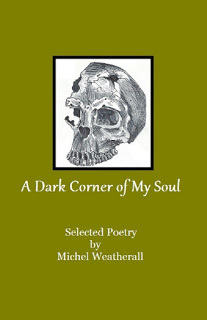
A short selective collection of dark poetry.
Available for pre-order.
To be released July 18, 2015.

Available on Amazon Kindle

as well as

A short selective collection of dark poetry.
Available for pre-order.
To be released July 18, 2015.

Available on Amazon Kindle

as well as
Published on June 28, 2015 02:59
June 24, 2015
The Hunt: Symbiosys
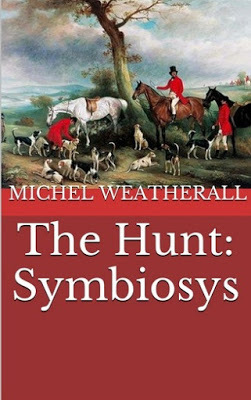
Barely eclipsing Global extinction, the young Gibbons couple are forced to flee and hide from forces intent on their eradication.

Centered between Montreal and Tokyo - the sequel to "The Symbiot" - "The Hunt: Symbiosys", follows a continental chess match and the advent of an unimaginable new world threat!

Available Autumn 2015!
Published on June 24, 2015 02:54
The Symbiot: Soon Available at Chapters!
Published on June 24, 2015 02:44
The Symbiot, now on Kobo!
Published on June 24, 2015 02:38
April 2, 2015
The Symbiot, Now on Kindle!

The Symbiot, a novella by Michel Weatherall, is now available on Kindle!
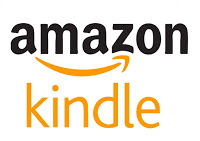
Find it here!
(US)
(Canada)
(UK)
Published on April 02, 2015 19:01
March 31, 2015
The Symbiot
The Symbiot, a novella by Michel Weatherall is available now!
 On sale at Kobold's Corner 430 Hazeldean Road, Kanata, Ontario
On sale at Kobold's Corner 430 Hazeldean Road, Kanata, Ontario
 as well as The Comic Book Shoppe, 1400 Clyde Avenue, Nepean, Ontario
as well as The Comic Book Shoppe, 1400 Clyde Avenue, Nepean, Ontario
 Also available on Kindle!
Also available on Kindle!
"One man's musical passion leads on a temporal hunt through a Lovecraftian world on a collision course with extinction!
"Reminiscent of Guy de Maupassant's The Horla."
'Seph Sayers, Blogger & Reviewer
 On sale at Kobold's Corner 430 Hazeldean Road, Kanata, Ontario
On sale at Kobold's Corner 430 Hazeldean Road, Kanata, Ontario as well as The Comic Book Shoppe, 1400 Clyde Avenue, Nepean, Ontario
as well as The Comic Book Shoppe, 1400 Clyde Avenue, Nepean, Ontario Also available on Kindle!
Also available on Kindle!
Published on March 31, 2015 19:57
January 16, 2015
Review and Commentary on "We Will be Landing Shortly", by Mike Hamel
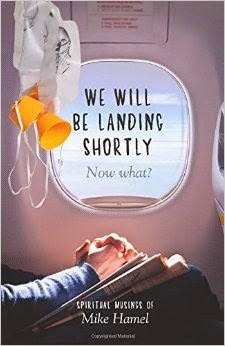 This book was a good and easy read. Not easy in the sense of its topic matter being 'light and fluffy', but easy in the sense of it being broken down into easily managed chapters, each being somewhere between 3-5 pages long.
This book was a good and easy read. Not easy in the sense of its topic matter being 'light and fluffy', but easy in the sense of it being broken down into easily managed chapters, each being somewhere between 3-5 pages long.What I also enjoyed was that - although there is an overarching theme - each chapter felt like Mike Hamel's mental meanderings; his thoughts, musings, and experiences of life. Ultimately, his wisdom.
"In the end I would be content if what was said of Solomon... could be said of me:
"Not only was the Teacher wise, but he also imparted knowledge to the people... The Teacher searched to find just the right words, and what he wrote was upright and true. (Ecclesiastes 12:9-10)", pg 143
I believe - at least to this humble reader - he accomplished this goal.
As for the subject matter itself, it is anything but light or fluffy.
 Mike Hamel approaches difficult, challenging, and potentially faith-breaking issues humbly, openly, honestly, and unassumingly. There is no agenda to sell. There is no argument to win, nor position to defend.
Mike Hamel approaches difficult, challenging, and potentially faith-breaking issues humbly, openly, honestly, and unassumingly. There is no agenda to sell. There is no argument to win, nor position to defend.A man after my own heart, he is simply seeking out answers, and possibly even to learn to ask the correct questions!
 He ponders upon horrifically difficult and unpleasant issues such as our own interpretations of God's handiwork, and an All Powerful and Loving God that will fail in His attempts at universal salvation, or a God who is self-serving and vindictive enough to need eternal conscious torment.
He ponders upon horrifically difficult and unpleasant issues such as our own interpretations of God's handiwork, and an All Powerful and Loving God that will fail in His attempts at universal salvation, or a God who is self-serving and vindictive enough to need eternal conscious torment.He ponders fundamentalists and the fundamentalist mindset.
He believes theology reveals more about its authors then its subject.
He struggles with whether we each have a specific and detailed purpose.
What Christianity would look like and function without a Heaven of the Afterlife (an issue I've referred to as Christian Spiritual Hedonism), and questions why the God of the Old Testament and New Testament don't look alike. (Yet another issue I've struggled with and come to terms with) - again, what if these stories tell us more about the people writing them rather than God himself - progressive revelation - and why evangelicals are so challenged by this answer.
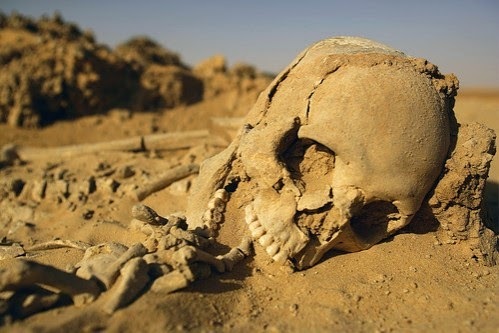 He is bothered by the genocide of Canaan (and correctly labels it as such) and the unspoken implication of Abraham so dedicately willing to murder his son, Isaac, for God's approval.
He is bothered by the genocide of Canaan (and correctly labels it as such) and the unspoken implication of Abraham so dedicately willing to murder his son, Isaac, for God's approval.He identifies the strength and value, as well as the limitations of metaphor and anthropomorphism in Scripture.
These are only some of the topics questioned and pondered about.
I think - for the majority - there are only two responses or reactions to the brutally difficult issues and challenges brought to light in this book.

To some, they choose to remain comfortable in their denial; refusing to accept these numerous inconsistencies and contradictions even exist.
To many others, they feel they must abandon their faith altogether, resorting to Agnosticism or Atheism.
But woven throughout this book is a 'way', a method, a worldview - if I were to be so bold - that refuses either of these extremes.
Cleverly woven throughout this book, his wisdom paints a picture - not of what we should or should not believe, but about a good, healthy, and reliable methodology we might employ on this journey.
Understanding that metaphors are culture-centric and flexible.
"Only the minting of new metaphors can keep theology from being reduced to archaeology" pg. 160Understanding and accepting that imagination and make-believe are two different things.
"God is the ultimate imaginary friend. This doesn't mean he is unreal, only that we have to use our imaginations to picture him since he is immaterial". pg. 188
 There are also a few great lessons regarding better understanding our own beliefs - regardless of what they are.
There are also a few great lessons regarding better understanding our own beliefs - regardless of what they are."Are [star] constellations real?" Stars are real; constellations are simply the names we assign to patterns of celestial luminaries. Constellations have "implied" not "intrinsic" reality. They are not native to the universe but exist only in the human mind. However, when enough people see the same shapes in the night sky, the constellations enter the collective consciousness and become as established as the stars themselves."The same thing happens in the firmament of divine revelations. Individual verses are linked in connect-the-dot fashion to form doctrines, which are then coerced into systematic theologies. A way of seeing truth becomes the truth itself." pg. 161
"Arranging information into comprehensible form is what the human mind does. The essence of intelligence is to discern patterns and to extrapolate their effects upon us. The error comes in assuming our mental picture is the truth rather than a metaphor for what lies beyond our reach" pg 162
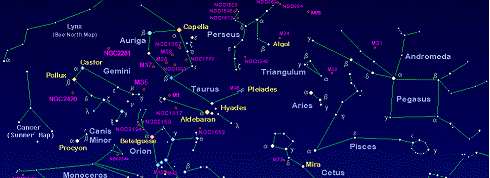
"Remember doing connect-the-dots pictures as a kid? Think of facts as the dots, faith as the lines drawn to connect them and the completed image as a worldview.
What happens when human knowledge explodes and new facts come to light? You can ignore them because they don't fit into your current picture or you can expand your paradigm accordingly. You don't necessarily have to give up your core to increase your circumference.I think there is a simple yet profound wisdom here. Not just for biblical interpretation and not just for Christians, but for all people.
Of course if you're convinced all truth is square you will reject the facts that are beyond your boxs regardless of whether they're real or not. But what is real? "Reality is that which, when you stop believing in it, doesn't go away". pg 194-195
We all have a Belief-System we follow and adhere to (Regardless whether you can name or label it).
Atheists, Christians, Buddhists, Muslims, Scientists. Our choices, our beliefs are the lines that connect-the-dots. The dots might be facts, but the lines we choose to connect them with are not necessarily, and we would do wise to remember that.
Many practicing Anglo-Catholics, Evangelicals, and Christian Fundamentalists might balk at Mike Hamel and relegate him into the inconsequential realms of the fallen faith or a spiritual seeker.
So who does this book speak to?
He answers this question early on in his book by saying:
"Some of my experiences and observations may help you with your journey. On the other hand, my queries and quibbling have been known to trip people up, so be careful. My aim isn't to confuse but to face confusion and grapple with things that don't make sense...
""In the act of tearing something apart, you lose its meaning". But deconstruction life can also lead to a clearer perspective of it. The slippery slope of questioning assumptions and dogmas doesn't only run downwards.
"To a cautious hiker, the thrill of getting close to the cliff may not seem worth the peril. To a compulsive climber like me, the challenge is irresistible" pg. 2
 I believe our society is in a spiritual flux, a segue of sorts; in the middle of a transition. With the numbers in traditional institutional religions dropping; with the decline of institutional religion, you can't believe what the pessimists say.
I believe our society is in a spiritual flux, a segue of sorts; in the middle of a transition. With the numbers in traditional institutional religions dropping; with the decline of institutional religion, you can't believe what the pessimists say.Yes, it may mean the death of religion (is that really such a bad thing?), but I believe there is a rise in non-institutional spirituality; not a shift towards Scientism/Atheism. A move away from what ultimately must be man-made religiosity, and towards the more all-encompassing and compassionate solace of spirituality.
By its very nature it is difficult to define and clearly categorize, but it is alive and well. I think it is to these people - and to those who are transitioning away from the more ridged institutional religions - that this book reaches out and speaks to.
I think "We Will be Landing Shortly" inadvertently sends a message:
"You are not alone".
He is a voice for a large number of people (and growing larger). He does not struggle and questions alone. He has a great amount of company "out there", in what many institutional religions might call a 'spiritual wilderness'.
Mike Hamel has rekindled my faith in faith, and my belief in a God without boundaries!
Disclosure of Material Connection: I received this book free from the author and/or publisher through the Speakeasy blogging book review network I was not required to write a positive review. The opinions I have expressed are my own. I am disclosing this in accordance with the Federal Trade Commission's 16 CFR, Part 255.
Published on January 16, 2015 11:23
July 31, 2014
Like nearly all Christian, Spiritual, or Theological book...
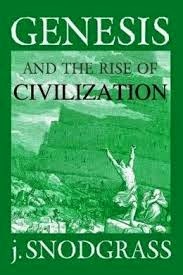 Like nearly all Christian, Spiritual, or Theological books I've read or reviewed, I feel it very important to understand the author's intent. If they're selling something, and if so, if they're up front about it.
Like nearly all Christian, Spiritual, or Theological books I've read or reviewed, I feel it very important to understand the author's intent. If they're selling something, and if so, if they're up front about it.It's important to know the confines (if any) or context in which the book should be viewed through; a theological lens if you will.
I do not believe J. Snodgrass holds any pretension in this regard. His intention is to explore and find the truth without any theological inhibitions, crutches, or addictions. It is best summoned up in the following lines:
"Do we read Genesis 1 as science or myth? Fact or fairy-tale? History or fiction or both? If it's not fact, can it still be true?" pg. 86
"I would say if one must challenge the nature of physical reality in order for the Bible to make sense, then the Bible has already lost its function in helping us understand the world we line in." pg. 111Snodgrass readily draws from the bible, apocrypha books, Midrash, the Qu'ran, numerous cultures' mythologies, and various other author's commentaries (surprisingly interesting ones as well, such as Mark Twain and Isaac Asimov).
It is safe to say, one should slaughter their sacred cows before entering this book... and that's a good and sober thing. A prerequisite is to have already purged Bibliolatry from your system.
This is not a book for Christian Fundamentalists, 'Bible Christians', or Biblical Literalists.
But on the same note, neither is this book a stoic, academic study with intentions of discrediting the bible and reducing it to meaningless and valueless fairy-tale.
This is not a book for people selling their truths, but only for those interested in pursuit and understanding of the truth.
Ultimately, I think in this case, it would be best to let the author speak for himself. At the end of the book the author adds his Original Introduction (pg. 282). This section is well worth the read, especially when attempting to gage the author's intentions, goals, and concerns.
Now that we know what we're getting into; now that I've peaked your interest or turned or scared you off the book, let's begin.
Let's jump right to the conclusion, the gist, straight to the punchline.
The book of Genesis is a parable of the agricultural revolution, written, rewritten, and edited by numerous authors.
"With human population growth comes settlement expansion, deforestation, and a decline in wild game. Tribes of hunter/gathers have access to less land and diminishing resources. And so we read this as a narrative about a tribe on the brink of starvation being extorted into submission by settled agriculturalists" pg. 192Esau/Jacob, Cain/Abel, Ishmael/Isaac; these narratives could be the same basic parable, as each community had its own story to explain how the herders and gardeners supplanted the hunters and gatherers.
Genesis repeatedly tells the story (told from both sides) of a progression from nomadic tribal societies to a resource-storing agricultural civilization.
The book also seriously questions whether this Progress is truly an evolving and beneficial thing.
"A tribe tended to be around 40 people bound together by kinship, which encouraged sharing and mutual support. Put simply: nobody eats unless everybody eats, nobody goes hungry unless everybody goes hungry... The migratory nature of these nomadic tribes made accumulation of material wealth impossible (in nomadic society whoever has the most stuff falls behind). There would typically be a chieftain and a witch-doctor, but these were part-time jobs for people who could take on extra responsibilities beyond the same food-acquisition done by everyone else. Their authority would derive from respect, not coercion, and titles were rarely hereditary. (...average chieftains job discription was "First to work, last to eat")" pg. 22-23No elitism here. Reminds me of Lao Tzu's 4 types of society.
"...modern religions mostly focus on Salvation, being saved from animal activities like food, feces, and fornication, these earlier religions seem to have been more focused on nurture and fertility: the abundance of nature and successful human reproduction... these early religions were about integrating theology with biology, whereas Salvation religions are about segregating them into 'sacred' and 'profane'." pg. 23Not only should the question whether this Progress is beneficial or not, it should make us take a sobering look at our modern day civilization and where we might be heading.
"In the wold, about 0.01% of naturally occurring biomass on this planet is edible by humans. On plantation lands cultivated for raising crops and livestock, up to 90% is edible. So an acre of land can feed far more farmers and herders than hunters and gatherers. But quantity is different from quality, and studies have shown that cultivated wheat has only half the protein-content of its wild relatives... The availability of more human food resulted in more human beings. Migratory nomads had to space out their births by an average of four years, so the first child could walk with the tribe while the second was carried." pg. 24
"With increased population density comes certain side-effects: diseases and plagues from over-crowding, poor sanitation and a narrowing diet... Promising to releave these conditions by communicating with the gods, the priesthood mutated from tribal co-op to central corporation". pg. 25And when anything becomes an industry it becomes compromised.
This would ultimately lead to empire, armies and the feudal system as, "With additional population density also came a rise in competition and violence, compounded by diminishing wild game for hunting and finite farmland for a growing posterity". pg. 25
The point is hammered home with these sobering lines,
"Civilization did not arise in response to famine... Famine arose in response to Civilization" pg. 32
But this "mutated" priesthood goes further.The feminine divine had been overwritten by a male god.Snodgrass even make mention of the often conveniently forgotten divine Wisdom, Sophia. (my favourite)
"I'm probably the only person who's ever wondered this, but... What would Biblical Creation have looked like if there was a woman involved? And I'm not talking about a Pandora-character who messes everything up for everyone forever. I mean a feminine creation partner, a mother-goddess. Could anything like that exist in the Bible?
"Actually yes, in Proverbs 8, which is centuries older than Genesis 1... This creation story stands out from its Biblical surroundings in that it is told from a feminine perspective." pg.'s 103-104"More and more archaeological, anthropological and mythological research points to a male mutiny against a cooperative matriarchal culture. (It must be stressed here that this is not a dominating matriarchal culture - it's not our current gender roles with women beating their husbands (though that's how patriarchal culture represents it with mythological symbols of sorceresses and sea-monsters and such). It's a cooperative culture with grandmothers as referees)." pg. 34
(There's a good and humorous analogy on pg's 100 & 101).
There is also an interesting theme at one point, basically Gnostic in flavour; specifically of rival and competing Gods. Although the word Gnostic isn't used (wisely) the gist is there.
I don't believe the point is to say that there is more than one God, but that the people of the time, through the cultural lens they wrote through, perceived it that way. And when their written works were rewritten, revised, and edited through the new lens of monotheism... a lot of confusion ensued.
Abraham's near sacrifice of Isaac is a theologically difficult story. A God who demanded the sacrifice and the same God who prevented it? (pg's 174-175).
Yet Abraham is allowed to haggle with God over the wholesale slaughter of Sodom. So which is it? Does God want his followers to be absolutely unquestioning slaves ("sacrifice you son, Isaac - just shut up and do it!") or equal partner ("What's your thoughts about wiping out Sodom?")? How can one reconcile this Coercing God with this Covenant God? (pg. 182). (Another example includes pg. 205).
All these issues are questioned and explored through various and numerous parables throughout Genesis in an honest, easily readable, and enlightening way, with a light peppering of humour.
Snodgrass does not come off as condescending, pretentious, lecturing, or preachy, but simply as a fellow student in search of the truth.
To the religious , this will be a book to pick at; to debate, to analyse, and rebuke, and an opportunity to perform theological gymnastics.
To the spiritual , this will be a wondrous journey; emancipating, freeing, and eye-opening. This book might very well reclaim the truth of Genesis from the clutches of Fundamentalists and Literalists, and maybe even bring its wisdom home.
Too long have we been told that only two choices exist. A Creationist, literal, historic truth, or a scientific falsity.
The Christian Fundamentalists and the Secular Atheists (scientism) do not own these truths. This book is our opportunity to reclaim them.
This is a paradigm-shifter. This book isn't about Belief , it's about understanding .
To the seeker of spiritual truths, be they Christian, Jew, Muslim, Buddhist, Agnostic, Taoist, or unlabeled, "Genesis and the Rise of Civilization" is a must read.
Disclosure of Material Connection: I received this book free from the author and/or publisher through the Speakeasy blogging book review network I was not required to write a positive review. The opinions I have expressed are my own. I am disclosing this in accordance with the Federal Trade Commission's 16 CFR, Part 255.
Published on July 31, 2014 11:22



